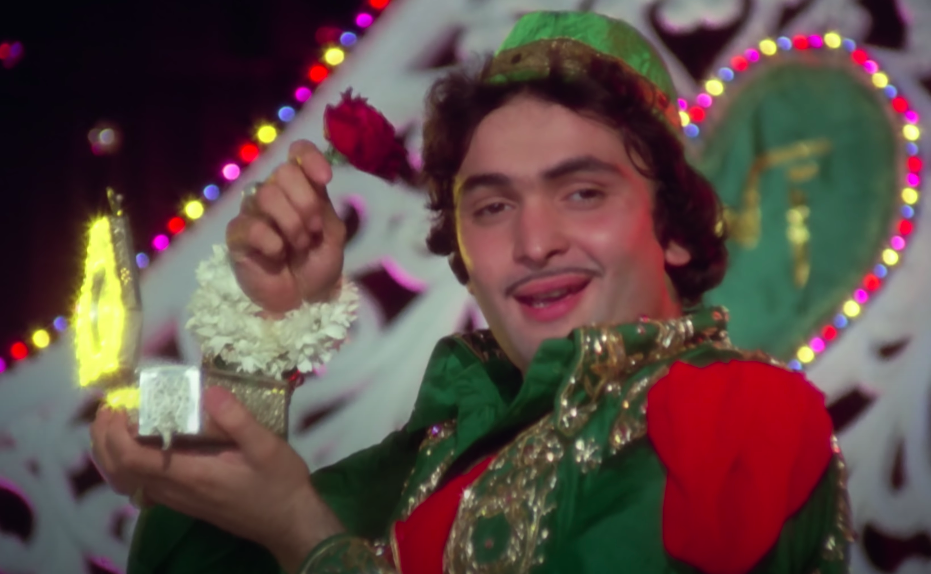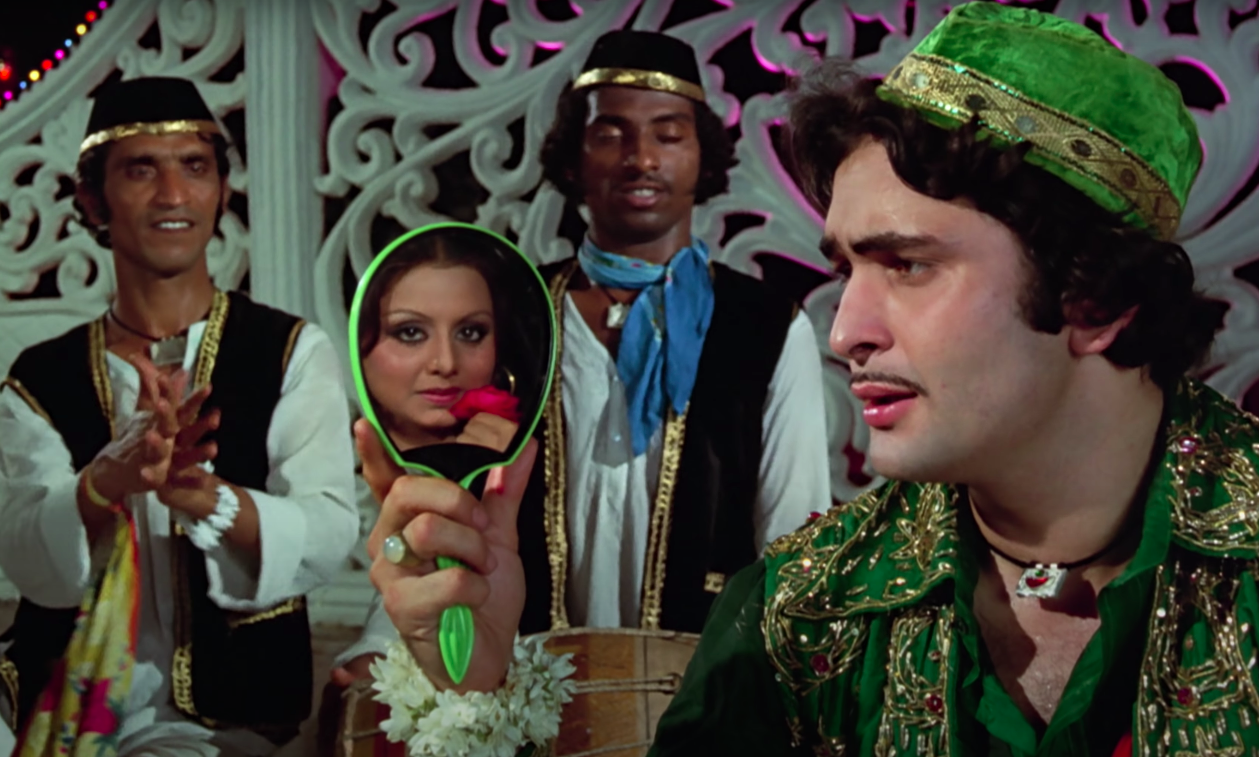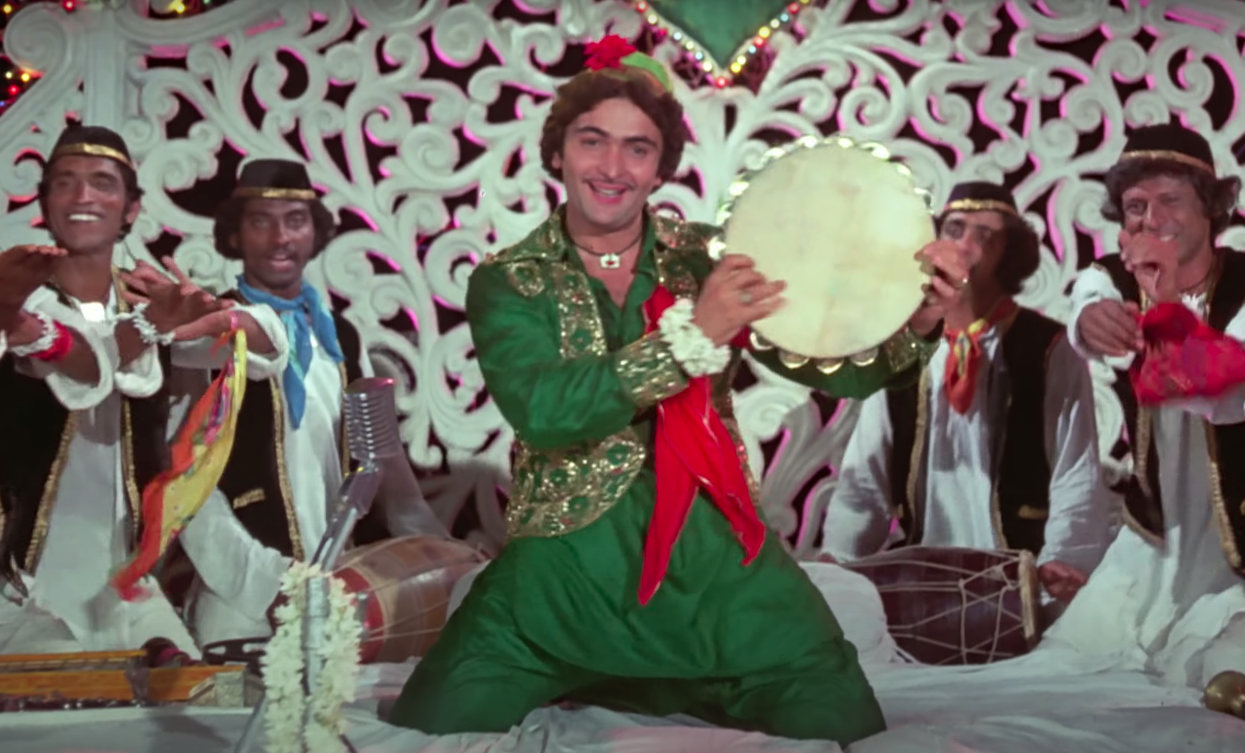
Rishi Raj Kapoor died at the age of 67 on April 30th, 2020 after a two-year struggle with acute myeloid leukemia. He is best known for his work as a leading hero in over one hundred Bollywood films including his debut role in Bobby (1973), Karz (1980), Saagar (1985), and Chandni (1989) among many others.
Today, we present the lyrics and English translation to pardaah hai pardaah from Amar Akbar Anthony (1977), which remains one of the most cherished performances by Bollywood’s original chocolate boy.
Directed by Manmohan Desai, Amar Akbar Anthony is an ode to secularism and religious tolerance that tells the story of of three brothers separated during childhood. Amar, played by Vinod Khanna, is the eldest Hindu-born brother who grows up to become a policeman. Anthony, played by Amitabh Bachchan, is the middle brother who becomes a practicing Christian and works as a liquor dealer. Finally, Akbar played by Rishi Kapoor, is the youngest brother who goes on to become a Muslim qawwali singer. Following a host of complicated turns and twists, the three brothers are reunited many years later after discovering their mutual roots.
In this film, Rishi Kapoor gives one of his most memorable performances in the beloved qawwali “pardaah hai pardaah.” Sung during his late-70’s comeback, Mohammad Rafi deserves equal praise for his expressive vocals under the direction of music composer duo Laxmikant-Pyarelal. Although the remainder of the soundtrack’s lyrics are standard Bollywood masala fare, Anand Bakshi’s lyrics for this number are exquisitely penned surrounding the common man-unveils-woman trope (see parde me.n rahne do, yeh jo chilman hai). With the use of words like shabaab, shahazaadii, and mahjabii.n, you might want to brush up on your Urdu vocabulary with our glossary provided below.
Need another movie to add to your quarantine watch list? Pay your tribute to the departed Mr. Kapoor and look no further than Amar Akbar Anthony – the full movie can be found here!
-Mr. ’55
R.I.P. Rishi Kapoor (1952 – 2020)

Parda Hai Parda: Lyrics and English Translation
MR: shabaab pe mai.n zaraa-sii sharaab phai.nkuu.ngaa I shall pour some wine over this youth. kisii hasii.n kii taraf yeh gulaab phai.nkuu.ngaa I shall throw this rose toward a beauty. pardaah hai pardaah, pardaah hai pardaah There is a veil, there is a veil. parde ke piichhe pardaanashii.n hai There is a woman behind the veil. pardaanashii.n ko bepardaah na kar duu.n to If I do not unveil the woman behind the veil... Akbar meraa naam nahii.n hai! then my name is not Akbar! mai.n dekhtaa huu.n jidhar, log bhii udhar dekhe.n Wherever I look, people look in the same direction. kahaa.n Thahartii hai jaa kar merii nazar dekhe.n They look at where my gaze stops. mere khvaabo.n kii shahazaadii, mai.n huu.n Akbar ilaahabaadii Oh, the princess of my dreams! I am Akbar of Allahabad. mai.n shaayar huu.n hasiino.n kaa, mai.n aashiq mahjabiino.n kaa I am a poet of beauty. I am a lover of beautiful women. teraa daaman na chhoDuu.ngaa, mai.n har chilman ko toDuungaa I shall not leave your side. I shall tear every curtain between us. na Dar zaalim zamaane se, adaa se yaa bahaane se Do not fear this cruel world. By grace or pretense, zaraa apnii suurat dikhaa de, samaa khuubsuurat banaa de please show your face and beautify the mood. nahii.n to teraa naam leke, tujhe koii ilzaam deke Otherwise I will sully your name with an accusation. tujhko is mahfil me.n rusvaa na kar duu.n If I do not dishonor you in this gathering... pardaanashii.n ko bepardaah na kar duu.n to If I do not unveil the woman behind the veil... AK: Akbar teraa naam nahii.n hai! then your name is not Akbar! MR: khudaa kaa shukr hai, chahraa nazar to aayaa hai Give thanks to the Lord, her face has been revealed! hayaa kaa rang nigaaho.n pe phir bhii chhaayaa hai Yet a tinge of modesty remains in her eyes. kisii kii jaan jaatii hai, kisii ko sharm aatii hai As I suffer, she shies away from me. koii aa.nsuu bahaataa hai, to koii muskuraataa hai As I shed tears, she cracks a smile. sataa kar is tarah aksar, mazaa lete hai.n ye dilbar My lover takes pleasure in torturing me so. yahii dastuur hai in kaa, sitam mashahuur hai in kaa Her cruel practices are known to all. khafaa hoke chahraa chhupaa le, magar yaad rakh husnvaale Hide your face in anger, my beautiful one, but remember this: jo hai aag terii javaanii, meraa pyaar hai sard paanii my love is like cold water for the fire of your youth. mai.n tere ghusse ko ThanDaa na kar duu.n haa.n If I do not calm your anger... pardaanashii.n ko bepardaah na kar duu.n to If I do not unveil the woman behind the veil... AK: Akbar teraa naam nahii.n hai! then your name is not Akbar! MR: pardaah hai pardaah, pardaah hai pardaah There is a veil, there is a veil. *MR = lines sung by Mohammed Rafi, AK = lines sung by Amit Kumar
GLOSSARY
shabaab: youth; sharaab: wine, alcohol; phainknaa: to throw; hasii.n: beautiful one; gulaab: rose; pardaah: veil; pardaahnashii.n: veiled woman; bepardaah karnaa: to unveil; Thaharnaa: to stop; khvaab: dream; shahazaadii: princess; illahabaadii: from Allahabad, a city in the Indian state of Uttar Pradesh; shaayar: poet; aashiq: lover; mahjabii.n: moon- like beauty; daaman chhoDnaa: to leave one's side; chilman: curtain; zaalim: cruel; zamaanaa: world; adaa: grace; bahaanaa: pretense; suurat: face; samaa: ambience, atmosphere; khuubsuurat banaanaa: to beautify; ilzaam: accusation; mahfil: gathering: rusvaa karnaa: to dishonor; shukr: thanks; chahraa: face; hayaa: modesty; nigaahe.n: eyes; sharm aanaa: to feel shy; sataanaa: to torture; mazaa lenaa: to take pleasure; dilbar: lover; khafaa: angry; husnvaale: beautiful one; aag: fire; javaanii: youth; sard: cold; ghussaah: anger.


Love and appreciate your newsletter!!!
Can you at some point please address the history of the obsession of movie makers and movie watchers in India with the rare occurrence of fair skin among the general masses; adulation of it, to be specific… For example, in the image below of Rishi with the dark scrawny token extras. It’s also routine standard in the mega dance scenes. A bit bizarre as well as embarrassing…. The common man -due to genetics -is dark- and this natural phenomenon is rejected en mass, if one uses Bollywood portrayals to fudge that notion. Thank heaven skin tone on screen is more realistic These days , but the obsession remains mysteriously otherworldly …
Thanks for all your work! 😍
Sent from my iPhone
>
Excellent points there!
I just stumbled on this blog, and saw this query re fair skin obsession. It comes from a class divide. From ancient times, the poorer classes/the masses were the labour class, working outdoors, and thus, had darker skin on account of being in the sun all day. Nobility, and royalty, were comparatively fair skinned, on account of hardly ever venturing outside.
The fairness of one’s skin denoted how higher up one was on the social strata. Thus, a fair-skinned person was prized over a darker one, and those biases have carried over from generation to generation in some form or another.
A very nostalgic song at a very appropriate time, remembering Rishi Kapoor.
Dear,
Mr. and Mrs. 🙂
Loved your latest newsletter. In this lockdown my mind and spirit broke all tradition and left the purdah to enjoy this universal language of music.
Thanks to you I love Urdu more than ever with a double scoop of beautiful poetry, immortalized with visuals of our movies.
What a life we all are having. Thank you for crystallizing our experiences before they are lost in this mundane life of a lockdown.
Could you also pen some of your Personal experiences, how you are dealing. Stay safe stay healthy.
Venkat Ramana
This is a great tribute to Chintu saab he was my fave growing up. Mr Romantic as opposed to Big B Mr Angry.
I wish we could celebrate secularism like this film, in modern day India, we seem to have gone backward since the 70s in this aspect.
My favourite line in this song (especially when Rafi sang it live) was “mai.n tere ghusse ko ThanDaa na kar duu.n haa.n” he would get wolf wistles and the audience would clap wildly. It was so suggestive. So great to see rafi’s cherub like blush and smile even wider than he usually would.
Also could you [pease show everyone your pic dressed as Akbar.
Khuda ka shukur hai Mrs 55.
PS around this time Rishi married Neetu, at the marriage Nusrat Fateh Ali sang for the guest. Could you imagine if we had had got NFAK to sing with rafi and lata (say in Laila Majnu). That would be greatest callobration.
Hi,
First of all, thanks so much for the wonderful descriptions of the genre and the translation.
Just a minor quibble regarding the word “parda” – a Persian word that actually means curtain/screen, rather than veil. Veil would be hijab in Arabic or chaadar in Persian.
The reason why screen is a better translation, despite the imagery in the scene: parda-nisheen is literally “one who sits behind the screen” or “the secluded/hidden one”. This refers to the screens that shielded the women of the house from ‘naa mahram” eyes; hence ‘parda-daar’ is ‘guardian of the screen’ rather than guardian of the veil. I think veil might be a little too direct and obvious.
“There’s a screen; behind the screen, a hidden one. And if I don’t reveal her, my name isn’t Akbar!”
Excellent commentary! I think this is a bit subtle as the word has been used more colloquially in Urdu to refer to the physical garment worn by women, but the discussion on its origins raises a great point! Thank you for sharing!
Yay!! Thank you so much for translating this song. I will never tire of this song .
Hi, thanks for reminding me how much I love this song and this film. I like its message of inter-religious unity. The Hindu, Muslim and Christian are all brothers and children of the same mother- or children of Mother India, if you will. I always thought that the purpose of its beautiful qawalli, besides its lovely lyrics and staging, of course, was to establish Akbar’s identity as the clearly Muslim brother in the film- the Muslim style of singing, his green Muslim outfit, the Arabic designs in the background, etc. I am a big fan of Mr. Kapoor as well.
Minor quibble: Amitabh’s cross in this scene looks a little more like an Ancient Egyptian ankh than any Christian cross I’ve ever seen.